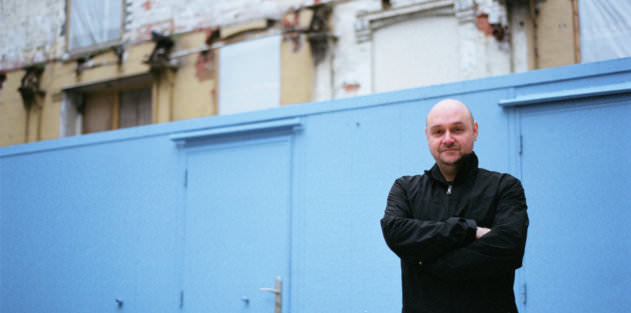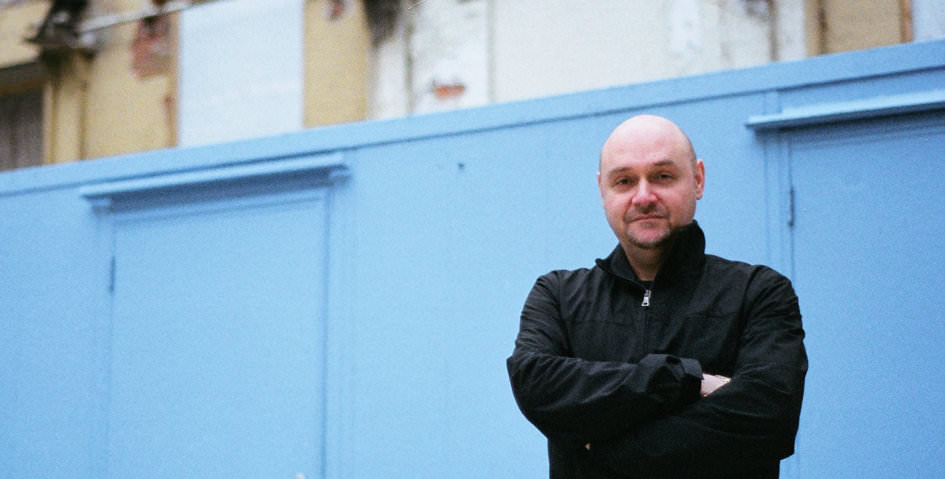From Derrick May’s unique approach to mentoring through to his current obsession with modular synths, the British techno pioneer invites us into his studio to hear the story of his unique involvement with Detroit’s innovators and find out why he has no interest in learning how to play a keyboard.

Best known under his As One guise, London-born Kirk Degiorgio has been a mainstay of the British techno scene since a visit to Detroit in 1990 inspired him to jump straight in at the deep end and set up a studio despite having no musical experience – other than as an obsessive fan of everything from soul to jazz to electro.
Twenty three years on and Kirk’s current studio, located in his Ipswich home, appears quite minimalist at first glance, but closer inspection reveals racks of modular synth gear housed in the desk and a separate case of processing modules tucked up against a wall. This is the carefully streamlined, heavily personalised setup of a man who admits to being inspired by gear and changing his equipment completely every few years to keep himself on his toes.
We fought off the attentions of Kirk’s exuberant pet kittens and sat down to discuss his approach to making music, the ethos behind the Machine club night he runs with Ben Sims, and Detroit legend Derrick May’s cryptic production tips.
Attack: Let’s begin by talking about your musical tastes before electronic music came along. What were you into before you discovered electro and techno?
Kirk Degiorgio: I was a soul boy. I have an aunt – she’s only six years older than me – who used to be a clubber in London, going to the soul clubs run by people like Chris Hill, Robbie Vincent and Froggy. Classic British DJs. Then she kind of grew out of it and gave me her record collection when I was about eleven. It had things like James Brown, the Fatback Band, Heatwave, Earth, Wind & Fire, all those classic soul bands, and I just fell in love with soul music. From there it was a case of being into soul and disco and then I really got into electro in ’82. I was already into rap, but when ‘Planet Rock’ came out that was my first big electronic influence.
I didn’t come to techno from that whole Kraftwerk, Cabaret Voltaire, Depeche Mode background. I wasn’t into that sort of music at all. It was more from Afrika Bambaataa, Cybotron, Juan Atkins and the early electro movement. Then I went through the rare groove scene and early house music was really all part of that black music scene. ‘Love Can’t Turn Around’ and the first early house things were all played in the soul clubs alongside Colonel Abrams’ ‘Trapped’ and the faster, more 4/4 type stuff that was coming in. We didn’t really see it as a distinct type of music until acid house came out, and then that whole movement became a separate scene. Techno was just an off-strand of that that I got attracted to because I noticed Juan Atkins was a producer and obviously I knew him from the electro days.
The soul boy era and the rare groove scene sometimes seem like they’ve almost been written out of history. There’s this accepted chronology of British musical movements which moves straight from punk and new wave into new romantics and takes a detour around all of that.
I think that’s just because the mainstream media is more familiar with punk and new wave. It’s a kind of race thing as well. Black music – which is what I was into – was a specialist kind of music. The magazines were Echoes and Blues & Soul. They were specialist magazines, whereas NME, Smash Hits and Sounds were mainstream.
It’s always been a specialist thing, I think. Even though a lot of the bands had commercial success – Kool & The Gang and Earth, Wind & Fire were always in the charts – it’s still… not really underground as such, but it’s a specialist strand of British music and it hasn’t been considered part of the mainstream pop story.
There’s a direct link there, which I’m sure is quite different to the American story, but it connects soul and black music directly into early house and techno…
The link would be the more adventurous soul music DJs. In the late 70s and early 80s in the south of England, the club scene was run by a group of DJs who called themselves the Soul Mafia. They effectively ran all the big Caister weekenders and the clubs in and around London and the home counties. I was obviously far too young to be DJing at this time but from what I’ve learnt it was very difficult for any other DJ to break into that select group – hence the name Soul Mafia, I believe.
DJs like Trevor Fung, Nicky Holloway, Gilles Peterson, Danny Rampling and a few others broke away and did their own thing, almost because they were forced to, in a way. They went off to Ibiza, found their own scene, brought it back and revolutionised things. Completely turned the tables. They were the ones getting gigs and the old Soul Mafia DJs have pretty much faded into obscurity.
Those old DJs like Pete Tong and Paul Oakenfold and guys like that – they were all old soul DJs. I remember going to Flicks in Dartford, a club run by a great DJ called Colin Hudd, and he was playing early house in ’86 alongside soul. So for me it was a continuation of the whole soul movement. There was no kind of great revolution. Whereas for people into punk and new wave who embraced house and techno it must have been a real revolution for them, going to clubs and dancing.
Then when the early Detroit techno came along you immersed yourself in it?
When I get into something I really obsess about it. My radio show for Red Bull Music Academy’s called Sound Obsession because I literally obsess about those types of music. I pick on a subject and I don’t let go, I just have to know everything about it.
I became like that with Detroit techno when it came out. I used to eagerly await every release by Derrick May, Carl Craig and all those guys. I was lucky that I went to Detroit and met them all during their peak time, so it was a bit different for me because I felt involved in the whole movement rather than watching it from a kind of collector or fan point of view. I was making music and getting advice and even getting equipment from people like Derrick May first hand, so it was a little bit different.

07.22 PM
His aunt outgrew “clubbing” at the age of seventeen?
08.38 PM
Great interview.
10.47 AM
Great inteview as always, keep ’em coming.
09.09 AM
That ma man Atjazz